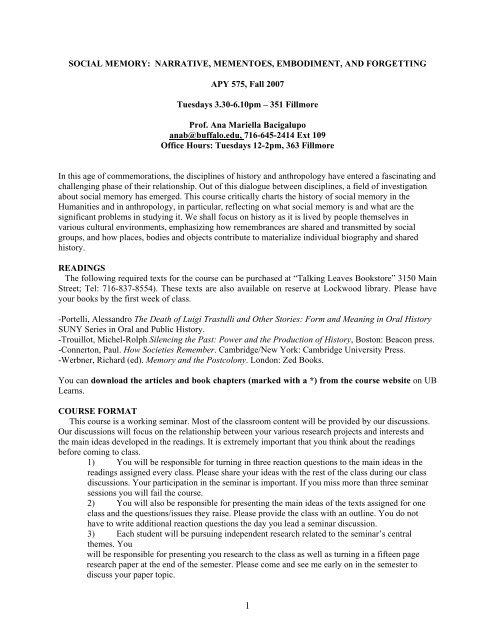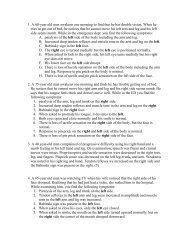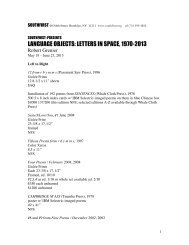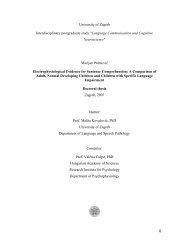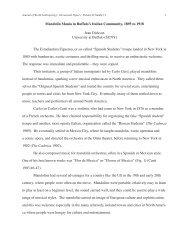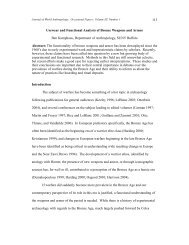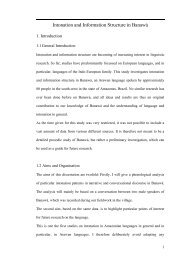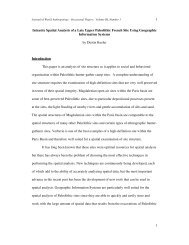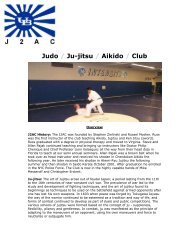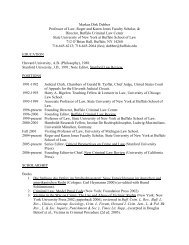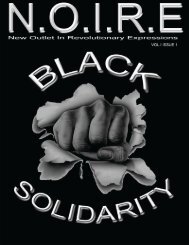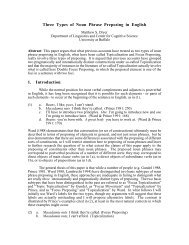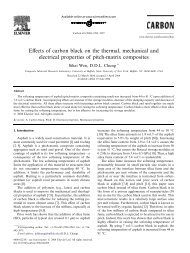social memory: narrative, mementoes, embodiment, and ... - Wings
social memory: narrative, mementoes, embodiment, and ... - Wings
social memory: narrative, mementoes, embodiment, and ... - Wings
Create successful ePaper yourself
Turn your PDF publications into a flip-book with our unique Google optimized e-Paper software.
SOCIAL MEMORY: NARRATIVE, MEMENTOES, EMBODIMENT, AND FORGETTING<br />
APY 575, Fall 2007<br />
Tuesdays 3.30-6.10pm – 351 Fillmore<br />
Prof. Ana Mariella Bacigalupo<br />
anab@buffalo.edu, 716-645-2414 Ext 109<br />
Office Hours: Tuesdays 12-2pm, 363 Fillmore<br />
In this age of commemorations, the disciplines of history <strong>and</strong> anthropology have entered a fascinating <strong>and</strong><br />
challenging phase of their relationship. Out of this dialogue between disciplines, a field of investigation<br />
about <strong>social</strong> <strong>memory</strong> has emerged. This course critically charts the history of <strong>social</strong> <strong>memory</strong> in the<br />
Humanities <strong>and</strong> in anthropology, in particular, reflecting on what <strong>social</strong> <strong>memory</strong> is <strong>and</strong> what are the<br />
significant problems in studying it. We shall focus on history as it is lived by people themselves in<br />
various cultural environments, emphasizing how remembrances are shared <strong>and</strong> transmitted by <strong>social</strong><br />
groups, <strong>and</strong> how places, bodies <strong>and</strong> objects contribute to materialize individual biography <strong>and</strong> shared<br />
history.<br />
READINGS<br />
The following required texts for the course can be purchased at “Talking Leaves Bookstore” 3150 Main<br />
Street; Tel: 716-837-8554). These texts are also available on reserve at Lockwood library. Please have<br />
your books by the first week of class.<br />
-Portelli, Aless<strong>and</strong>ro The Death of Luigi Trastulli <strong>and</strong> Other Stories: Form <strong>and</strong> Meaning in Oral History<br />
SUNY Series in Oral <strong>and</strong> Public History.<br />
-Trouillot, Michel-Rolph Silencing the Past: Power <strong>and</strong> the Production of History, Boston: Beacon press.<br />
-Connerton, Paul. How Societies Remember. Cambridge/New York: Cambridge University Press.<br />
-Werbner, Richard (ed). Memory <strong>and</strong> the Postcolony. London: Zed Books.<br />
You can download the articles <strong>and</strong> book chapters (marked with a *) from the course website on UB<br />
Learns.<br />
COURSE FORMAT<br />
This course is a working seminar. Most of the classroom content will be provided by our discussions.<br />
Our discussions will focus on the relationship between your various research projects <strong>and</strong> interests <strong>and</strong><br />
the main ideas developed in the readings. It is extremely important that you think about the readings<br />
before coming to class.<br />
1) You will be responsible for turning in three reaction questions to the main ideas in the<br />
readings assigned every class. Please share your ideas with the rest of the class during our class<br />
discussions. Your participation in the seminar is important. If you miss more than three seminar<br />
sessions you will fail the course.<br />
2) You will also be responsible for presenting the main ideas of the texts assigned for one<br />
class <strong>and</strong> the questions/issues they raise. Please provide the class with an outline. You do not<br />
have to write additional reaction questions the day you lead a seminar discussion.<br />
3) Each student will be pursuing independent research related to the seminar’s central<br />
themes. You<br />
will be responsible for presenting you research to the class as well as turning in a fifteen page<br />
research paper at the end of the semester. Please come <strong>and</strong> see me early on in the semester to<br />
discuss your paper topic.<br />
1
GRADING<br />
Your course grade will be based on the following:<br />
1) Class participation <strong>and</strong> discussion 15%<br />
2) Leading of seminar discussion 20%<br />
3) Reaction questions 15%<br />
4) Oral presentation of your paper 20%<br />
5) Final paper (15 pages double spaced ) 30%<br />
INTRODUCTION: THE EMERGENCE OF MEMORY STUDIES<br />
-*Golden Charles 2005 (Book review) “Where does Memory Reside, <strong>and</strong> Why Isn’t it History?” Pp 270-<br />
274.<br />
-*Klein, Lee. 2000. “On the Emergence of Memory in Historical Discourse.”<br />
-*Winter, Jay. 2000. “The Generation of Memory: Reflections on the Memory Boom in Contemporary<br />
Historical Studies.”<br />
-*Berliner, David. 2005. “The Abuses of Memory: Reflections on the Memory Boom in Anthropology.”<br />
WHAT IS COLLECTIVE MEMORY (I)<br />
-Connerton, Paul. “Social Memory”. In: How Societies Remember.<br />
- *Halbwachs, Maurice. 1992. On Collective Memory Pp. 37-51.<br />
-*Nora, Pierre. 1989 “Between Memory <strong>and</strong> History: Les Lieux de Mémoire.”<br />
-*Gedi, Noa <strong>and</strong> Yigal Elam. 1996. “Collective Memory: What Is It?”<br />
WHAT IS COLLECTIVE MEMORY (II)?<br />
-*Thomson, Frisch & Hamilton. 1994. “The Memory <strong>and</strong> History Debates…”<br />
-*Funkenstein, Amos. 1989. “Collective Memory <strong>and</strong> Historical Consciousness.”<br />
-*Kansteiner, Wulf. 2002. “Finding Meaning in Memory: A Methodological Critique…”<br />
-*Susan Crane 1997 “Writing the Individual Back into Collective Memory”<br />
HISTORY, MEMORY AND METHODOLOGY (1)<br />
-*Frisch “Presenting <strong>and</strong> Receiving Oral History Across Cultural Space” In A Shared Authority<br />
-*Frisch “Oral History, Documentation <strong>and</strong> the Mystification of Power” In A Shared Authority<br />
-Portelli Chap 1 & 2 In The Death of Luigi Trastulli<br />
ORAL HISTORY, MEMORY AND METHODOLOGY (1I)<br />
-Portelli Chap 3, 4, 6 & 9 In The Death of Luigi Trastulli<br />
POWER AND THE PRODUCTION OF HISTORY<br />
-Trouillot, Michel Rolp Chapters 1, 3, 4 & 5 In Silencing the Past<br />
HISTORICITIES<br />
-*Hirsch & Stewart “Introduction: Ethnographies of Historicity”<br />
-*N Whitehead “Introduction” In Histories <strong>and</strong> Historicities in Amazonia Pp VII-XX<br />
-*Reeve “Cauchu Uras: Lowl<strong>and</strong> Quichua Histories of the Amazon Rubber Boom” in Rethinking History<br />
<strong>and</strong> Myth.<br />
-*Santos Granero, Fern<strong>and</strong>o 1998 “Writing History into the L<strong>and</strong>scape: Space, Myth, <strong>and</strong> Ritual in<br />
Contemporary Amazonia.”<br />
MULTIPLE AND CONTESTED PASTS<br />
-*Appadurai, Arjun. 1981. “The Past as a Scarce Resource.”<br />
-*Bloch, Maurice “Time, Narrative <strong>and</strong> the Multiplicity of Representations of the Past”<br />
2
-*Rappaport, Joanne. “Introduction: Interpreting the Past” In: The Politics of Memory Pp 1-27.<br />
-*Rappaport, Joanne “Julio Niquinas, a Contemporary Nasa Historian” In: The Politics of Memory Pp<br />
175-195.<br />
MEMORY, POST-COLONIALISM, AND NATION BUILDING<br />
-Werbner “Beyond Oblivion” In Memory <strong>and</strong> the Post-colony.<br />
-*Jennifer Cole 1998 “The Work of Memory in Madagascar”<br />
-*Herzfeld, Michael. 1991. “Histories in Conflict.” In: A Place in History..<br />
-Meyer, Birgit. "Make a Complete Break with the Past: Memory <strong>and</strong> Postcolonial Modernity in Ghanaian<br />
Pentecostal Discourse” In Memory <strong>and</strong> the Postcolony.<br />
TRAUMATIC AND VICARIOUS MEMORIES<br />
-*Lambek &Antze. “Introduction: Forecasting Memory” In Tense Past: Essays in Trauma <strong>and</strong> Memory.<br />
-*Climo, Jacob. 1995. “Prisoners of Silence: A Vicarious Holocaust Memory.”<br />
-*Tschunggnall &Welzer 2002 “Rewriting Memories: Family Recollections of the National Socialist Past<br />
in Germany.”<br />
-*Stewart, Michael. 2004. “Remembering without Commemoration: The Mnemonics <strong>and</strong> Politics of<br />
Holocaust Memories among European Roma.”<br />
EMBODIED AND PERFORMATIVE MEMORIES<br />
-Connerton, Paul. “Bodily Practices.” In: How Societies Remember.<br />
-*Stoller, Paul. 1994. Embodying Colonial Memories. American Anthropologist 96(3): 634-648.<br />
-*Casey, Edward. 2000. Body Memory. In: Remembering: a Phenomenological Study.<br />
-*Lambek “The Sakalava Poiesis of History: Realizing the Past Through Spirit Possession”<br />
OBJECTS OF MEMORY<br />
-*Radley, Alan. 1990. “Artefacts, Memory <strong>and</strong> a Sense of the Past.” In Collective Remembering.<br />
*Parkin, David. 1999. “Mementoes as Transitional Objects in Human Displacement.”<br />
-*Ash, Juliet. 1996. “Memory <strong>and</strong> Objects” In The Gendered Object.<br />
-*Brown, Karen Mc Carthy 1999 “Telling a Life: Race, Memory <strong>and</strong> Historical Consciousness”<br />
SITES OF REMEMBRANCE AND COMMEMORATION<br />
-Connerton, Paul. “Commemorative Ceremonies.” In: How Societies Remember.<br />
-*Casey, Edward. 2000. “Place Memory.” In Remembering: a Phenomenological Study.<br />
-*Kuchler, Susanne. The Place of Memory. In The Art of Forgetting.<br />
-Werbner, Richard. “Smoke from the Barrel of a Gun: Postwars of the Dead, Memory <strong>and</strong> Reinscription<br />
in Zimbabwe.” In Memory <strong>and</strong> the Postcolony.<br />
FORGETTING<br />
-*Carsten, Janet. 1995. “The Politics of Forgetting: Migration, Kinship <strong>and</strong> Memory on the Periphery of<br />
the Southeast Asian State.”<br />
-*Forty, Adrian. 1999. Introduction. In The Art of Forgetting.<br />
-*Battaglia, Deborah. 1993. “At Play in the Fields (<strong>and</strong> Borders) of the Imaginary: Melanesian<br />
Transformations of Forgetting.”<br />
-Trouillot Chapter 2 In Silencing the Past:<br />
12/4 STUDENT PAPER PRESENTATIONS<br />
12/10 FINAL PAPERS DUE<br />
ADDITIONAL RESOURCES AND RECOMMENDED READINGS<br />
3
http://www.phil.mq.edu.au/staff/jsutton/Social<strong>memory</strong>.htm<br />
http://www.history.ucsb.edu/faculty/marcuse/classes/201/index.html#1<br />
-Kirshenblatt-Gimblett, Barbara. 1989. Objects of Memory: Material Culture as Life Review. In: Elliott<br />
Oring (ed). Folk Groups <strong>and</strong> Folklore Genres: A Reader. Pp. 329-338. Logan: Utah State University<br />
Press.<br />
-Shaw, Rosalind. 2001. “Spirit Memoryscapes” In Memories of the Slave Trade. Ritual <strong>and</strong> the Historical<br />
Imagination in Sierra Leone.<br />
-Kenny, Michael. 1996. Trauma, Time, Illness, <strong>and</strong> Culture. An Anthropological Approach to Traumatic<br />
Memory. In: Antze, Paul <strong>and</strong> Michael Lambek (eds). Tense Past. Cultural Essays in Trauma <strong>and</strong> Memory.<br />
Pp. 151-171. London/New York: Routledge.<br />
-White, Geoffrey 2001 “Histories <strong>and</strong> Subjectivities.” Ethos.<br />
-Bastide, Roger. 1978. Problems of Collective Memory. In: The African Religions of Brazil: Toward a<br />
Sociology of Interpenetration of Civilizations. Pp. 240-259.<br />
-Dosal, Paul Che Guevara in Death, Dismemberment <strong>and</strong> Memory.<br />
-Popular Memory Group. 1982. Popular Memory: Theory, Politics, Method. In: Richard Johnson et. al.<br />
(eds). Making Histories: Studies in History-Writing <strong>and</strong> Politics. Pp. 205-52. Minneapolis: University of<br />
Minnesota Press.<br />
- Fentress J. <strong>and</strong> C. Whickham. 1992. Social <strong>memory</strong>. New Perspectives on the Past. Oxford: Blackwell.<br />
Read Introduction.<br />
-E Wolf “Introduction” in Europe <strong>and</strong> the People Without History Pp 1-23<br />
- Augé, Marc. 2004. Oblivion. Minnesota: University of Minnesota Press.<br />
- Baxter, Charles. 1999. Introduction. In: The Business of Memory. The Art of Remembering in an Age<br />
of Forgetting. Pp. 141-157.<br />
- La Capra, Dominique. 1998. Chapter 1. History <strong>and</strong> Memory: In the Shadow of the Holocaust. In:<br />
History <strong>and</strong> Memory after Auschwitz. Pp 8-42. Ithaca: Cornell University Press.<br />
- Vansina, Jan. 1980. Memory <strong>and</strong> Oral Tradition. In: Miller, Joseph (ed). The African Past Speaks.<br />
Essays in Oral Tradition <strong>and</strong> History. Pp. 262-279. Folkestone: Dawson-Archon.<br />
- Goody, Jack. 1998. Memory in Oral Tradition. In: Fara, Patricia <strong>and</strong> Patterson, Karalyn (eds). Memory.<br />
Cambridge: Cambridge University Press.<br />
- Kenny, Michael 1999 A Place for Memory: The Interface between Individual <strong>and</strong> Collective History.<br />
Society for Comparative Study of Society <strong>and</strong> History 41(3): 420-437.<br />
- Leydesdorff, Selma, Luisa Passerini <strong>and</strong> Paula Thompson. 1996. Introduction. In: Gender <strong>and</strong> Memory.<br />
Pp. 1-16. Oxford: Oxford University Press.<br />
- Burchianti, Margaret. 2004. Building Bridges of Memory: The Mothers of the Plaza de Mayo <strong>and</strong> the<br />
Cultural Politics of Maternal Memories. History <strong>and</strong> Anthropology 15(2): 133-150.<br />
- Hershatter, Gail. 2002. The Gender of Memory: Rural Chinese Women <strong>and</strong> the 1950s. Signs 28(1): 43-<br />
70.<br />
- Ely, Richard <strong>and</strong> Allysa McCabe. 1996. Gender Differences in Memories Speech. In: Leydesdorff,<br />
Selma, Luisa Passerini <strong>and</strong> Paula Thompson (eds). Gender <strong>and</strong> Memory. Pp. 17-30. Oxford: Oxford<br />
University Press.<br />
-Pohl<strong>and</strong>t-McCormick, Helena 2000. "I Saw a Nightmare: Violence <strong>and</strong> the Construction of Memory”<br />
-Bloch, Maurice. “The Resurrection of the House amongst the Zafimaniry of Madagascar.” In: How We<br />
Think They Think.<br />
- Strathern, Andrew. 1996. Habit or Habitus? Theories of Memory, the Body, <strong>and</strong> Change. In: Body<br />
Thoughts. Pp. 25-39. Ann Arbor: The University of Michigan Press.<br />
-Lambek, Michael. 1998. The Sakalava Poesis of History. Realizing the Past through Sakalava Spirit<br />
Possession. American Ethnologist 25(2): 106-127.<br />
-Francis Doris, Leonie Kellaher <strong>and</strong> Georgina Neophytou. The Cemetery. A Site for the Construction of<br />
Memory, Identity <strong>and</strong> Ethnicity. In: Climo Jacob <strong>and</strong> Maria Cattell (eds). Social Memory <strong>and</strong> History.<br />
Anthropological Perspectives. Pp. 95-110. Walnut Creek: Altamira Press.<br />
4
-Healy, Chris. 1994. Histories <strong>and</strong> Collecting: Museums, Objects <strong>and</strong> Memories. In: Darian-Smith Kate<br />
<strong>and</strong> Paula Hamilton (eds). Memory <strong>and</strong> History in Twentieth-Century Australia. Pp. 33-51. Oxford:<br />
Oxford University Press.<br />
-Hill &Wright “Time, Narrative <strong>and</strong> Ritual: Historical Interpretations from an Amazonian Society”<br />
-Lazzara, Michael J.<br />
2006 Chile in Transition: The Poetics <strong>and</strong> Politics of Memory. Gainsville: University Press of Florida.<br />
-Lipsitz, George<br />
2001 Time Passages: Collective Memory <strong>and</strong> American Popular Culture. Minnesota: University of<br />
Minnesota Press.<br />
-Mallon, Florencia<br />
2005 Courage Tastes of Blood: The Mapuche Community of Nicolás Ailío <strong>and</strong> the Chilean State, 1906–<br />
2001. Durham, NC: Duke University Press.<br />
-Oakdale, Susan<br />
2005 I Forsee My Life: The Ritual Performance of Autobiography in an Amazonian Community. Lincoln<br />
<strong>and</strong> London: University of Nebraska Press.<br />
-Rappaport, Joanne<br />
2005 Intercultural Utopias: Public Intellectuals, Cultural Experimentation <strong>and</strong> Ethnic Pluralism in<br />
Colombia. Durham <strong>and</strong> London: Duke University press.<br />
-Rubenstein, Steven<br />
2002 Alej<strong>and</strong>ro Tsakimp: A Shuar Healer in the Margins of History. Lincoln: University of Nebraska<br />
Press.<br />
-Sturken, Marita<br />
1997 Tangled Memories: The Vietnam War, the AIDS Epidemic, <strong>and</strong> the Politics of remembering.<br />
Berkeley: University of California press.<br />
-Lipsitz, George<br />
2001 Time Passages: Collective Memory <strong>and</strong> American Popular Culture. Minnesota: University of<br />
Minnesota Press.<br />
-White, Geoffrey 2006 “Epilogue: Memory Moments” Ethos<br />
-Lambek, Michael<br />
2002 The Weight of the Past: Living with History in Mahajanga, Madagascar. Palgrave.<br />
- Goody, Jack. 1998. Memory in Oral Tradition. In: Fara, Patricia <strong>and</strong> Patterson, Karalyn (eds). Memory.<br />
Cambridge: Cambridge University Press.<br />
- Bastide, Roger. 1978. Problems of Collective Memory. In: The African Religions of Brazil: Toward a<br />
Sociology of Interpenetration of Civilizations. Pp. 240-259. Baltimore: John Hopkins University Press.<br />
- Berliner, David. 2005. The Abuses of Memory. Reflections on the Memory Boom in Anthropology.<br />
Anthropological Quarterly 78(1): 183-197.<br />
- Vansina, Jan. 1980. Memory <strong>and</strong> Oral Tradition. In: Miller, Joseph (ed). The African Past Speaks.<br />
Essays in Oral Tradition <strong>and</strong> History. Pp. 262-279. Folkestone: Dawson-Archon.<br />
5


